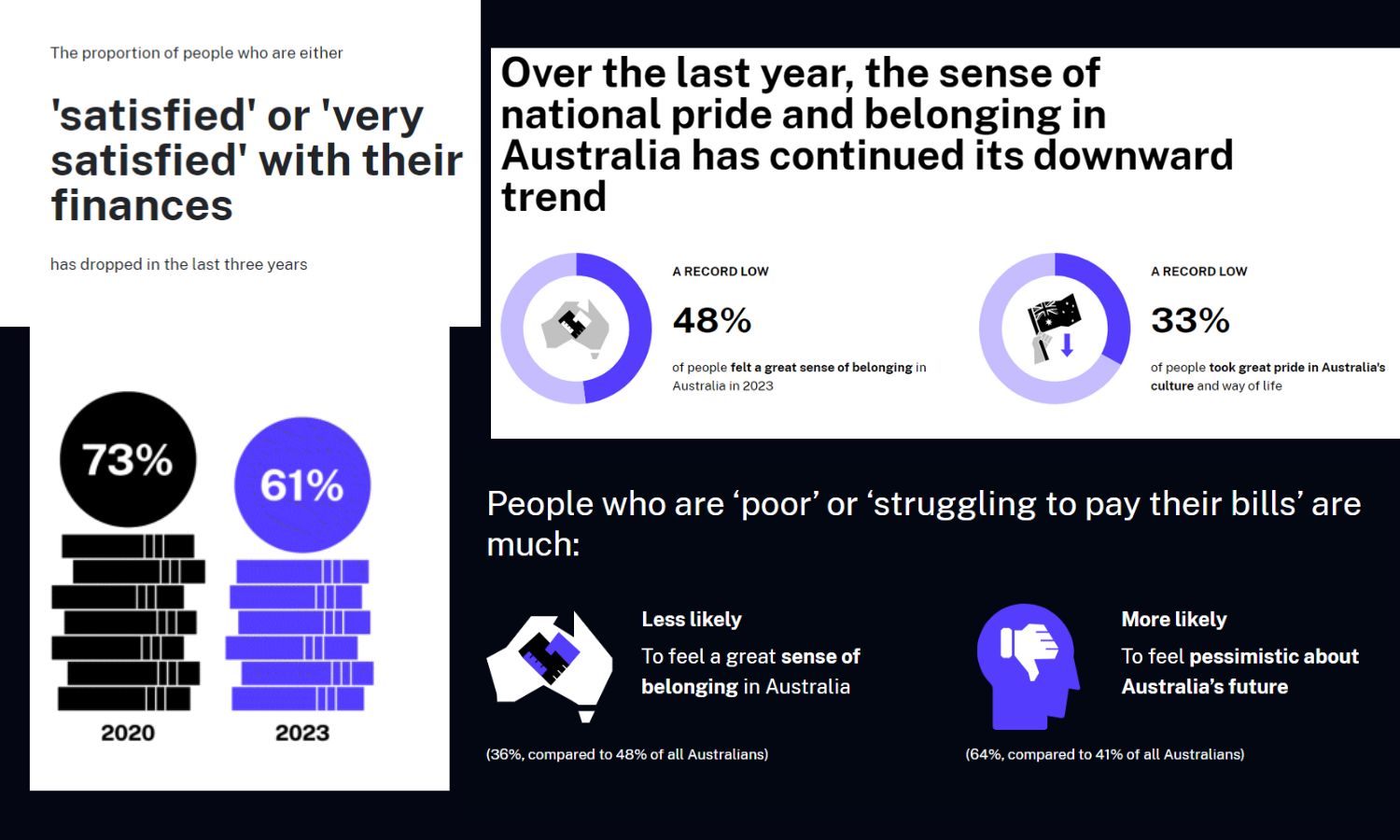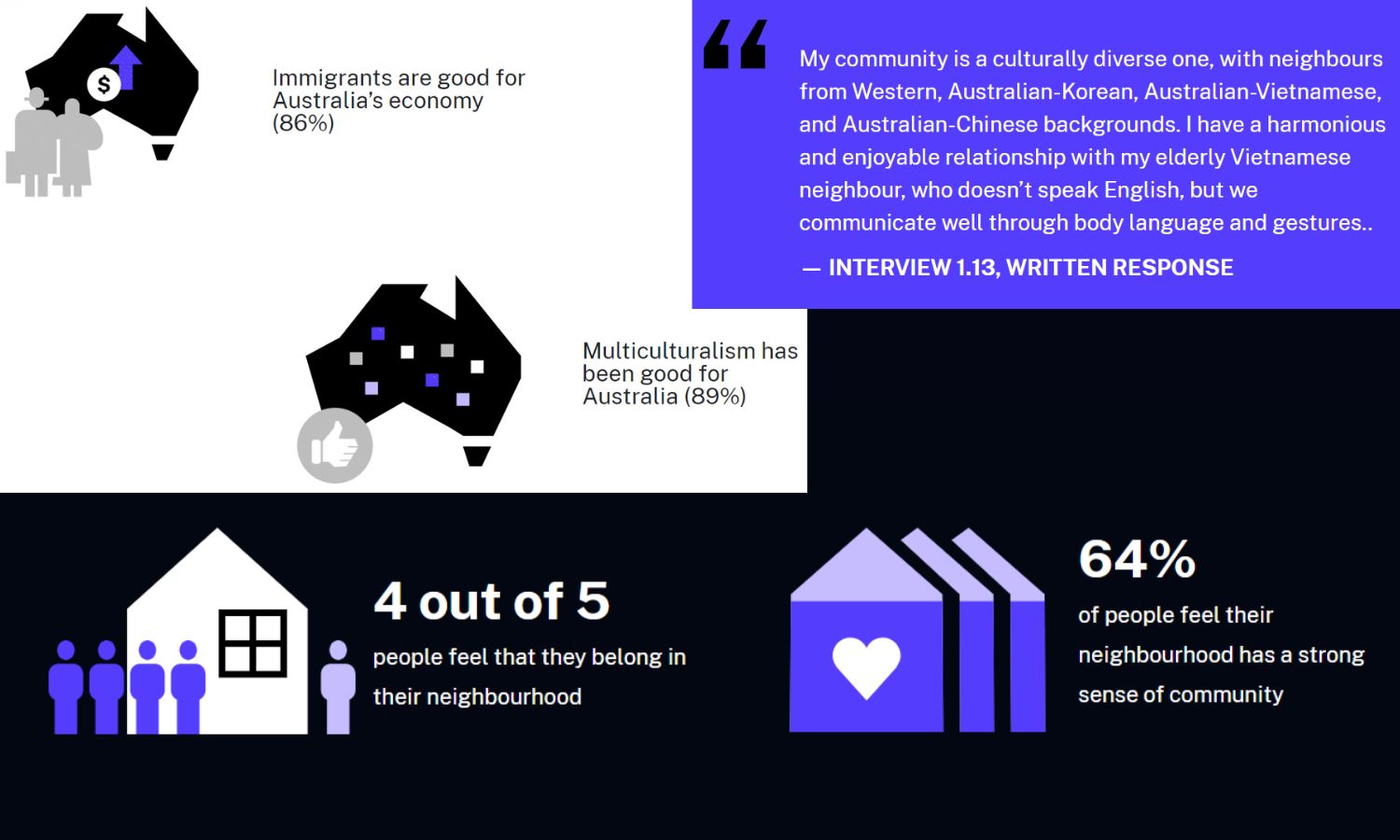Australia has had a rough go of it over the past few years. Fires, floods, plague, and now economic turbulence and increasing poverty. All of it has taken a toll but a new report has claimed that the strain of modern-day life is tearing the fabric of society apart.
The Scanlon Institute’s Social Cohesion Index for 2023 has found that social cohesion is at its lowest point since the project began mapping the concept in 2007. Aussies are currently experiencing a declining trust in government, a loss of national pride, and a loss of optimism for the future, the report finds.
Sub-titled ‘A Tear In the Fabric?’, the report notes that social cohesion in Australia has been remarkably resilient throughout recent challenges but that cost of living pressures, rising interest rates, and gloomy economic output are putting a strain on that. Mateship, ‘a fair go’, and a sense of belonging are all under attack.
“Our results indicate that many of the challenges are connected,” report author Dr James O’Donnell has said.
“Cost-of-living pressures are likely contributing to increased financial stress and increased concern for economic inequality. These, in turn, are connected to a declining sense of national belonging, increased pessimism for the future and declining trust in government”.
Through a comprehensive survey of over 100 questions gathered from over 7,500 people, the report found that Australians’ sense of self-worth, social inclusion, and justice were being eroded by growing concerns over economic inequality.

Just 63% of respondents said that they were satisfied or very satisfied with their finances, down from 73% in 2020. One in ten report struggling to afford their rent or mortgage while one in five struggle to afford healthcare.
84% of respondents believe that the gap between high and low-income earners is too large while only 38% believe people on low incomes are being supported sufficiently by the government.
“No one is going for a holiday *laughs*, no one goes to the cinema… So we just sit at home, go to work, come back, and then pay bills…,” one respondent said.
“Community social events, people don’t have them… So the social fabric, how it operates, is disappearing,” another said.
The report states that declining national pride is strongly tied to declining trust in government. One in three people believe that people in power abuse their position ‘most’ or ‘all of the time’. Only 36% believe the Federal government does the right thing for Australian people ‘all’ or ‘most of the time’.
The Voice to Parliament debate was one event the report highlighted as further entrenching division in the country. However, it notes that 86% of people still view the relationship between Aboriginal and Torres Strait Islander people and wider Australian society as very important.
“Heightened concern about economic inequality and social justice has seen more Australians questioning governments and their ability to do the right thing by those who are struggling,” O’Donnell said.
“Both of these things then contribute to people feeling less of a sense of connection to Australian values and society, and less pride in how we’re tracking as a nation”.
Despite this, it’s not all bad news. The report has also found that Australia is broadly a happy nation, with 79% of people reporting that they were happy or very happy in general. This hasn’t really changed in the past five years.
In addition, Australians have an “overwhelmingly positive” view of multiculturalism and the contribution of migrants to society, culture, and the economy. These views have been growing since 2018 and show no signs of slowing down. Negative attitudes towards people from China or with Muslim backgrounds have dropped significantly since 2020.

A silver lining of the COVID-19 pandemic was an uptick in neighbourhood belonging and community cohesion. The authors of the report state that the pandemic appeared to have a galvanising effect on people.
“These collective experiences mean those bonds are not easily broken and can be a lasting positive legacy of the pandemic,” it reads.
While the report is concerning, it does highlight that these issues are not specific to Australia as much of the world has gone through similar problems. What it does point out is that political and economic events are much more interlinked with our sense of national identity and relationship with each other than we might believe. As such, those issues can also be addressed.
“Community and government efforts to strengthen economic wellbeing, while supporting and drawing on the strength of our social connections and wellbeing, can go a long way to ensuring a cohesive, resilient and vibrant society in the years to come,” O’Donnell said.
Related: What the Rising Interest Rates Mean For Your Wallet and Stress Levels
Related: Feeling Stressed About Climate Change? You’re Not Alone
Read more stories from The Latch and subscribe to our email newsletter.







